When people think about higher education, they typically think of a four-year bachelor’s degree that includes both major-specific and general education courses. However, another postsecondary educational route can lead to job opportunities with high earning potential in growing fields: trade schools and programs.
For students considering this path, there are some key things to understand about how online trade schools and programs operate, how much they cost, how to apply, and the benefits and drawbacks of attending these programs. To help students prepare for an online trade school or program, Dana Marvin, a college admissions expert, offers guidance on some common questions. Our research team also evaluated dozens of schools and programs to create this list of the 20 best online trade schools and programs.
What Students Should Know About Online Trade Schools and Programs
Trade schools go by many names, such as vocational or technical schools and career colleges. Additionally, many traditional two- and four-year colleges that offer associate and bachelor’s degrees also offer trade programs. This list includes specific trade schools and traditional colleges offering trade programs.
As you search for the right online trade school or program, there are a few things to remember.
For-profit versus non-profit status
When considering whether to attend a trade school, knowing its status as a for-profit or nonprofit institution is important. Many well-known trade schools, such as American Career College, University of Phoenix, and Lincoln College of Technology, are for-profit institutions. While for-profit schools can offer valuable educational and career opportunities, their primary function is to earn revenue for shareholders and executives, which can lead to deceitful business practices and limited investment in students and educational resources.
On the other hand, nonprofit schools are not meant to turn a profit. They must reinvest all revenue into the institution through faculty and staff salaries, infrastructure, student services, and more. These schools are also held to higher accreditation standards. With this in mind, this list only includes nonprofit schools.
Curriculum
Regardless of the type of institution, all trade programs have one thing in common: career-focused training designed to give students the specialized skills they need for a particular job or industry in a short time frame.
Attending an online trade school or program can prepare students for careers in a variety of fields, including:
- Health care
- Information technology
- Heating, ventilation, and air conditioning systems (HVAC)
- Construction
- Cosmetology
- Carpenters
- Welders
- Masons
- Electricians
- Mechanics
“Trade schools are a great alternative for students who want to jump straight into a career,” Marvin says. “While traditional college programs require students to take general education classes to ensure a well-rounded education outside their major courses, trade school programs skip that and go right into career-related courses. In a trade program, students’ classes, assignments, and projects will be relevant to their prospective career and help them master their craft.”
Eligibility criteria
Because of the more focused nature of their coursework, online trade schools and programs typically have less rigid admissions requirements than traditional degree programs. This can include lower thresholds for high school GPAs or standardized test scores and a simple, straightforward application process. However, all schools set their own admissions criteria and policies, so confirm requirements and procedures with schools before applying.
Degrees granted
Trade programs typically culminate in a diploma or certificate, although programs offered at two-year colleges may lead to an associate degree. Educational requirements for vocational careers will depend on the specific job, industry standards, and state regulations.
“All skilled crafts taught in trade schools have their own credentials, licenses, and requirements that a person needs to work in that field legally,” Marvin says. “Depending on the trade, students may want or need to go on to earn additional certifications to continue advancing in their fields.”
Our Ranking Criteria
To create our list of the top 20 online trade schools, we researched over 120 colleges and universities across the United States and narrowed them down to this list of the 20 best online trade schools. We based our research on the online materials on each school’s website, including aggregate rankings from reputable publications that compare the best schools. Criteria were based on four key factors: academic quality, graduation rate, cost and return on investment, and available student resources. We included only nonprofit institutions to ensure program quality and institutional best practices.
The 20 Best Online Trade Schools and Programs
1. Northcentral Technical College
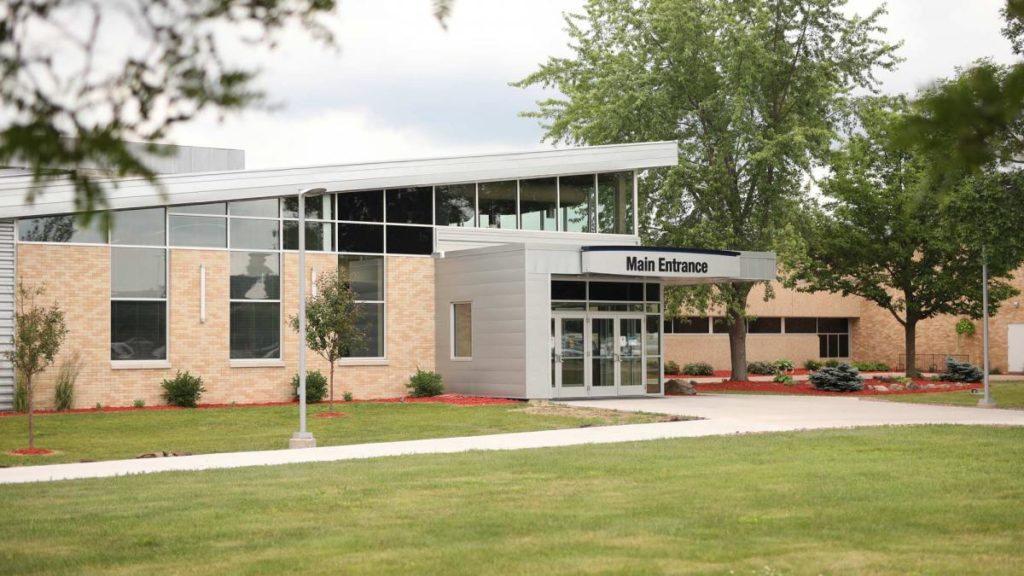
If you want a smaller institution with programs in high-demand fields, Northcentral Technical College (NTC) may be the right online school for you. Popular majors include emergency medical technician (EMT paramedic), nursing, and welding. NTC has six campus locations in north central Wisconsin, so students who value a hybrid alternative can find the most convenient location. Other programs include crop science, fire medic, and applied mechanical CAD technician.
Learn more about Northcentral Technical College’s online trade school programs.
| Cost Per Credit | Resident: $146
Non-Resident: $219 |
| Student Enrollment | 6,069 |
| Graduation Rate | 56% |
| Required Credits to Graduate | Certificate: 3-21
Diploma: 7-32 Associate: 61-65 |
| Accreditation | Higher Learning Commission |
| Location | Wausau, WI |
2. West Kentucky Community and Technical College
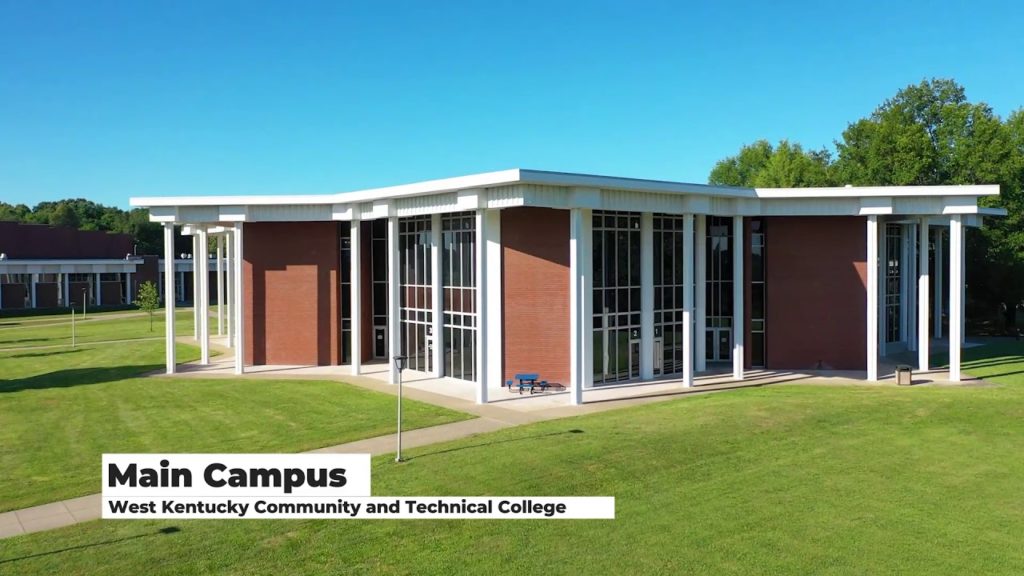
In 2021, West Kentucky Community and Technical College (WKCTC) was a Finalist of Distinction for the Aspen Prize. This national award recognizes the best community colleges for their high performance and achievement of equitable outcomes for their students during and after college. WKCTC’s online programs include business administration, criminal justice, marine technology, and medical information technology.
Learn more about West Kentucky Community and Technical College’s online trade school programs.
| Cost Per Credit | $186 |
| Student Enrollment | 5,309 |
| Graduation Rate | 43% |
| Required Credits to Graduate | Certificate: 4-29
Diploma: 36-50 Associate: 60-68 |
| Accreditation | Southern Association of Colleges and Schools Commission on Colleges |
| Location | Paducah, KY |
3. Forsyth Technical Community College

Forsyth Tech Community College has provided high-quality, affordable postsecondary education programs in Winston-Salem for over 50 years. In addition to their associate degree programs, they offer classes and certifications to prepare you for a new career in as little as 12 weeks. Their online programs include cybersecurity, entrepreneurship, automotive systems technology, public safety administration, and supply chain management.
Learn more about Forsyth Technical Community College’s online trade school programs.
| Cost Per Credit | Resident: $76
Non-Resident: $268 |
| Student Enrollment | 8,270 |
| Graduation Rate | 21% |
| Required Credits to Graduate | Certificate: 13-18
Diploma: 36 Associate: 60-69 |
| Accreditation | Southern Association of Colleges and Schools Commission on Colleges |
| Location | Winston-Salem, NC |
4. North Dakota State College of Science
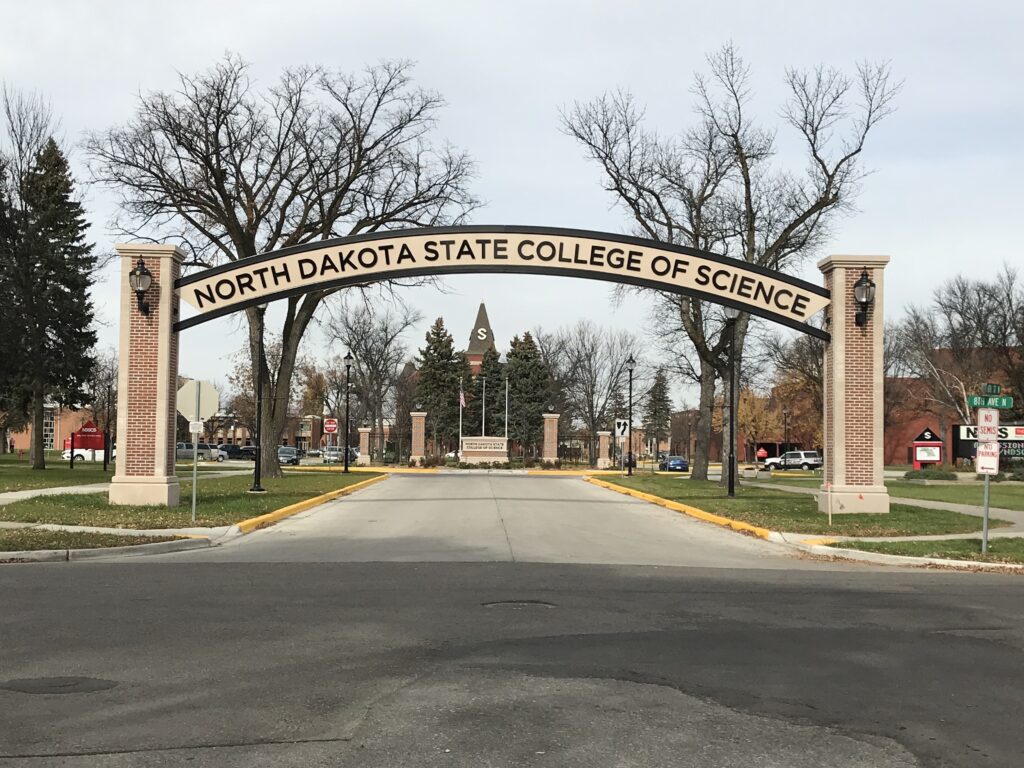
The North Dakota State College of Science provides a wide variety of online programs for the fields of business management, health information, and communications technology. An online pharmacy technician program is available as well. Incoming first-year students may qualify for the NDSCS Scholarship, which offers up to $2,000 depending on your high school GPA and ACT score.
Learn more about North Dakota State College of Science’s online trade school programs.
| Cost Per Credit | $153 |
| Student Enrollment | 2,942 |
| Graduation Rate | 47% |
| Required Credits to Graduate | Certificate: 16-31
Associate: 63-69 |
| Accreditation | Higher Learning Commission |
| Location | Wahpeton, ND |
5. Gateway Community and Technical College

Gateway Community and Technical College consistently ranks as one of the top online community colleges for its class offerings and affordability. With the lowest tuition rates in Kentucky, Gateway offers several programs entirely online, and with multiple start dates, they make it easy to find a program that fits your schedule. Students can expect the same quality online resources that they’d see as traditional, on-campus students, including a local eLearning support center for students who need a little more assistance while pursuing a new career.
Learn more about Gateway Community and Technical College’s online trade school programs.
| Cost Per Credit | $186 |
| Student Enrollment | 4,440 |
| Graduation Rate | 40% |
| Required Credits to Graduate | Certificate: 6-24
Associate: 60-67 |
| Accreditation | Higher Learning Commission |
| Location | Florence, KY |
6. Dakota College at Bottineau

Founded in 1906 as a forestry school, Dakota College at Bottineau now provides academic programs for many additional subject areas. They currently offer 21 online programs, including bookkeeping, photography, medical coding, recreation management, and urban forest management. It’s also worth noting that this school provides a 24/7 help desk for any technical issues you may encounter while studying online.
Learn more about Dakota College at Bottineau’s online trade school programs.
| Cost Per Credit | Resident: $246
Non-Resident: $340 |
| Student Enrollment | 1,080 |
| Graduation Rate | 33% |
| Required Credits to Graduate | Certificate: 15-31
Associate: 60-61 |
| Accreditation | Higher Learning Commission |
| Location | Bottineau, ND |
7. Wake Technical Community College

This school offers an extensive selection of online programs to choose from, including popular majors such as business administration and early childhood education, as well as more niche subject areas like international logistics, fraud examination, and ethical hacking. Over 100 online programs are available at Wake Technical Community College.
Learn more about Wake Technical Community College’s online trade school programs.
| Cost Per Credit | Resident: $76
Non-Resident: $268 |
| Student Enrollment | 21,551 |
| Graduation Rate | 26% |
| Required Credits to Graduate | Certificate: 13-18
Diploma: 36-39 Associate: 60-72 |
| Accreditation | Southern Association of Colleges and Schools Commission on Colleges |
| Location | Raleigh, NC |
8. Hazard Community & Technical College

Hazard Community & Technical College is an excellent choice for those who plan to work in IT, as they offer over 20 online degree and certificate options in this field, including programs for networking, information security, mobile app development, and video game design. They also offer online programs in several other subject areas, including business administration, criminal justice, and unmanned systems technology.
Learn more about Hazard Community & Technical College’s online trade school programs.
| Cost Per Credit | $186 |
| Student Enrollment | 2,556 |
| Graduation Rate | 36% |
| Required Credits to Graduate | Certificate: 3-30
Diploma: 40-49 Associate: 60-64 |
| Accreditation | Southern Association of Colleges and Schools Commission on Colleges |
| Location | Hazard, KY |
9. Alexandria Technical & Community College

This school’s online and hybrid programs allow students to quickly become qualified for various in-demand occupations, such as medical coding specialist, ophthalmic medical technician, nursing assistant, and speech-language pathology assistant. Alexandria Technical & Community College has a job placement rate of 98%, so you can be confident that they will help you advance your career.
Learn more about Alexandria Technical & Community College’s online trade school programs.
| Cost Per Credit | $211 |
| Student Enrollment | 2,865 |
| Graduation Rate | 66% |
| Required Credits to Graduate | Certificate: 16-25
Diploma: 38-66 Associate: 60-75 |
| Accreditation | Higher Learning Commission |
| Location | Alexandria, MN |
10. Wiregrass Georgia Technical College

Wiregrass Georgia Technical College’s fully online options include six degree, five diploma, and 24 certificate programs. They offer many ways to earn credit through prior learning assessment, such as military training, corporate training, apprenticeship training, and student portfolios, which may allow you to significantly reduce the time and money it takes to complete your college education.
Learn more about Wiregrass Georgia Technical College’s online trade school programs.
| Cost Per Credit | In-State: $100
Out-of-State: $200 |
| Student Enrollment | 4,003 |
| Graduation Rate | 35% |
| Required Credits to Graduate | Certificate: 10-33
Diploma: 42-55 Associate: 60-64 |
| Accreditation | Southern Association of Colleges and Schools Commission on Colleges |
| Location | Valdosta, GA |
11. Central Georgia Technical College

Central Georgia Technical College is another good choice for anyone interested in an IT career — they offer online programs for some of the most valuable certifications in this field, including CompTIA A+ and AWS Cloud Practitioner. They also offer online programs that can prepare you for many other occupations, including drafter’s assistant, metrology technician, and medical skin care specialist.
Learn more about Central Georgia Technical College’s online trade school programs.
| Cost Per Credit | In-State: $100
Out-of-State: $200 |
| Student Enrollment | 9,683 |
| Graduation Rate | 46% |
| Required Credits to Graduate | Certificate: 9-36
Diploma: 37-59 Associate: 60-72 |
| Accreditation | Southern Association of Colleges and Schools Commission on Colleges |
| Location | Warner Robins, GA |
12. Barton County Community College

From accounting to wildlife sciences, dozens of 100% online associate degree and certificate programs are available at Barton County Community College. They offer several scholarships to help you pay for your college education, including the Barton Bound Scholarship for those graduating high school with at least a 2.5 GPA, the Barton Boost Scholarship for those who display financial need, and the Silver Promise Scholarship for those over 65. One-on-one remote tutoring sessions are available for online students as well.
Learn more about Barton County Community College’s online trade school programs.
| Cost Per Credit | $155 |
| Student Enrollment | 4,269 |
| Graduation Rate | 31% |
| Required Credits to Graduate | Certificate: 16-46
Associate: 60 |
| Accreditation | Higher Learning Commission |
| Location | Great Bend, KS |
13. Northwood Technical College
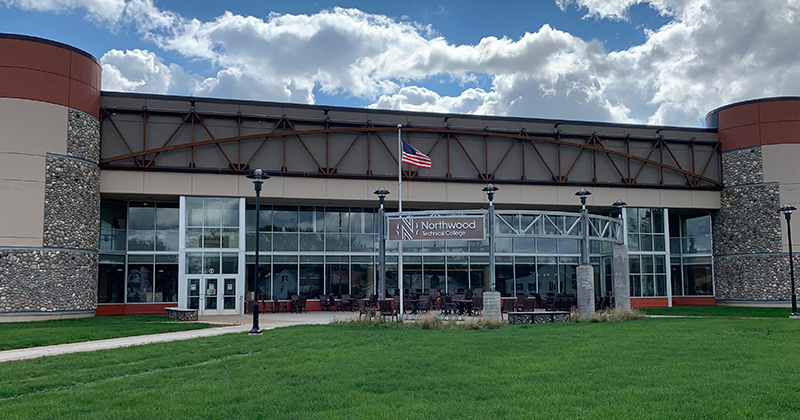
Northwood Technical College was founded over 100 years ago as one of the first technical schools in Wisconsin. 95% of Northwood Tech students are employed within six months of graduating, and graduates report an average salary increase of 54% five years after graduation. The school currently offers 35 online programs for students, including options for child care, tax preparation, criminal justice, and nonprofit leadership.
Learn more about Northwood Technical College’s online trade school programs.
| Cost Per Credit | In-State: $160
Out-of-State: $233 |
| Student Enrollment | 2,677 |
| Graduation Rate | 61% |
| Required Credits to Graduate | Certificate: 10-15
Diploma: 13-30 Associate: 60-62 |
| Accreditation | Higher Learning Commission |
| Location | Shell Lake, WI |
14. Minnesota West Community and Technical College
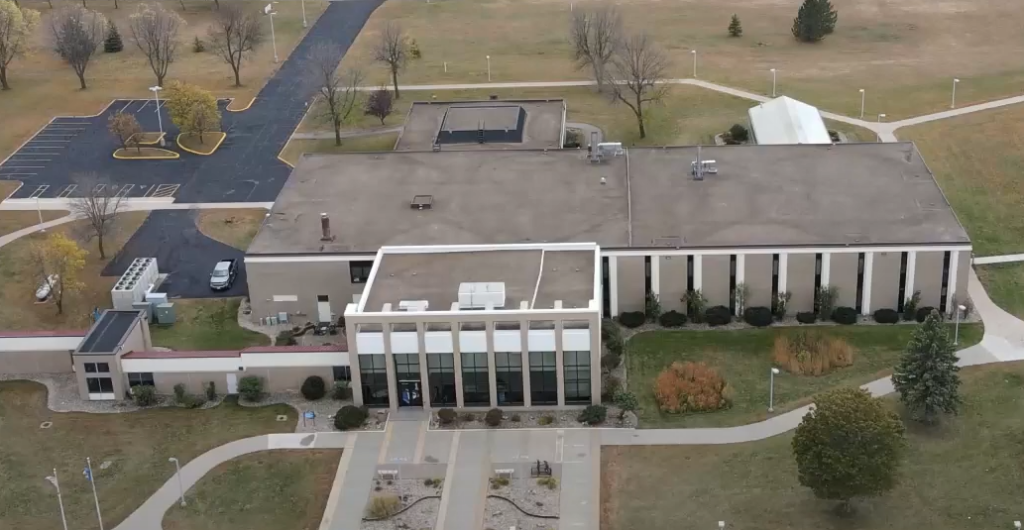
Minnesota West Community and Technical College is dedicated to helping students “learn with purpose.” This phrase became the school’s motto after a commencement speaker used the phrase to describe how, after graduating from a prestigious four-year university, they found that they needed to return to school at Minnesota West to truly prepare for their career. There are over 40 online associate, diploma, and certificate programs available at this school.
Learn more about Minnesota West Community and Technical College’s online trade school programs.
| Cost Per Credit | $207 |
| Student Enrollment | 3,352 |
| Graduation Rate | 47% |
| Required Credits to Graduate | Certificate: 10-23
Diploma: 30-51 Associate: 60-64 |
| Accreditation | Higher Learning Commission |
| Location | Granite Falls, MN |
15. Fayetteville Technical Community College
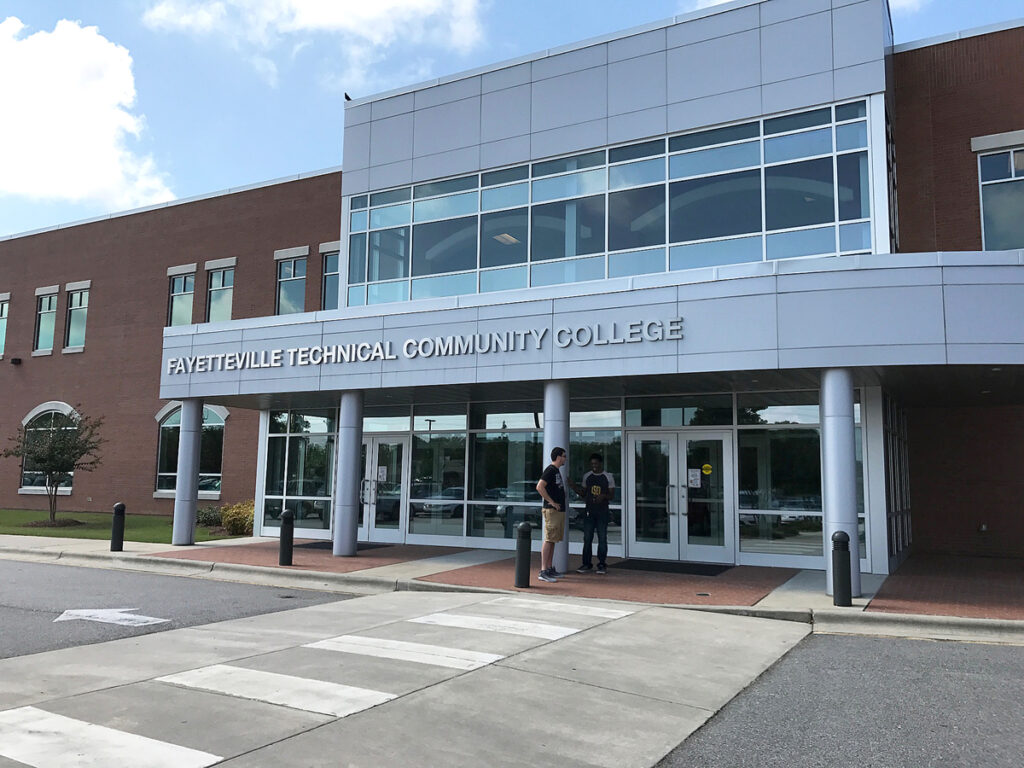
If you’re affiliated with the military, Fayetteville Technical Community College (FTCC) should be one of the first options you consider for trade school. Military students can access tuition grants, military training credit, and waived administrative fees. Also, FTCC’s career services for veterans include resume assistance and mock interview opportunities to help prepare you for the civilian workforce.
Learn more about Fayetteville Technical Community College’s online trade school programs.
| Cost Per Credit | Resident: $76
Non-Resident: $268 |
| Student Enrollment | 10,233 |
| Graduation Rate | 22% |
| Required Credits to Graduate | Certificate: 12-18
Associate: 60-66 |
| Accreditation | Southern Association of Colleges and Schools Commission on Colleges |
| Location | Fayetteville, NC |
16. Guilford Technical Community College

Guilford Technical Community College offers an online Six Sigma Green Belt program that will make you a sought-after business professional, as it teaches you the most effective techniques for problem-solving, team-building, and improving processes. They also offer online programs for data analysis, fire protection technology, medical office administration, and many other subject areas.
Learn more about Guilford Technical Community College’s online trade school programs.
| Cost Per Credit | In-State: $76
Out-of-State: $268 |
| Student Enrollment | 10,067 |
| Graduation Rate | 22% |
| Required Credits to Graduate | Certificate: 12-18
Associate: 60-68 |
| Accreditation | Southern Association of Colleges and Schools Commission on Colleges |
| Location | Jamestown, NC |
17. Northwest Technical College

The online programs at Northwest Technical College can prepare you for many different occupations within the business/entrepreneurship and health and human services industries. You can also enter the manufacturing field with their online production technologies program. This school uses D2L Brightspace for its online learning management system, widely regarded as a remarkably well-designed and user-friendly platform for students.
Learn more about Northwest Technical College’s online trade school programs.
| Cost Per Credit | $211 |
| Student Enrollment | 721 |
| Graduation Rate | 45% |
| Required Credits to Graduate | Certificate: 16-29
Diploma: 32-40 Associate: 60 |
| Accreditation | Higher Learning Commission |
| Location | Bemidji, MN |
18. Clovis Community College

Clovis Community College offers online programs for behavioral science, business administration, computer information systems, criminal justice, general studies, legal assistant studies, liberal arts, and mathematics. They provide 24/7 free online tutoring for many subject areas through the TutorMe platform. You can also remotely access Clovis’s on-campus tutors via live chat on Monday through Friday from 8:00 a.m. to 5:00 p.m.
Learn more about Clovis Community College’s online trade school programs.
| Cost Per Credit | In-District: $48
Out-of-District: $59 Non-Resident: $121 |
| Student Enrollment | 2,303 |
| Graduation Rate | 18% |
| Required Credits to Graduate | Certificate: 3-33
Associate: 60-63 |
| Accreditation | Higher Learning Commission |
| Location | Clovis, NM |
19. Lone Star College
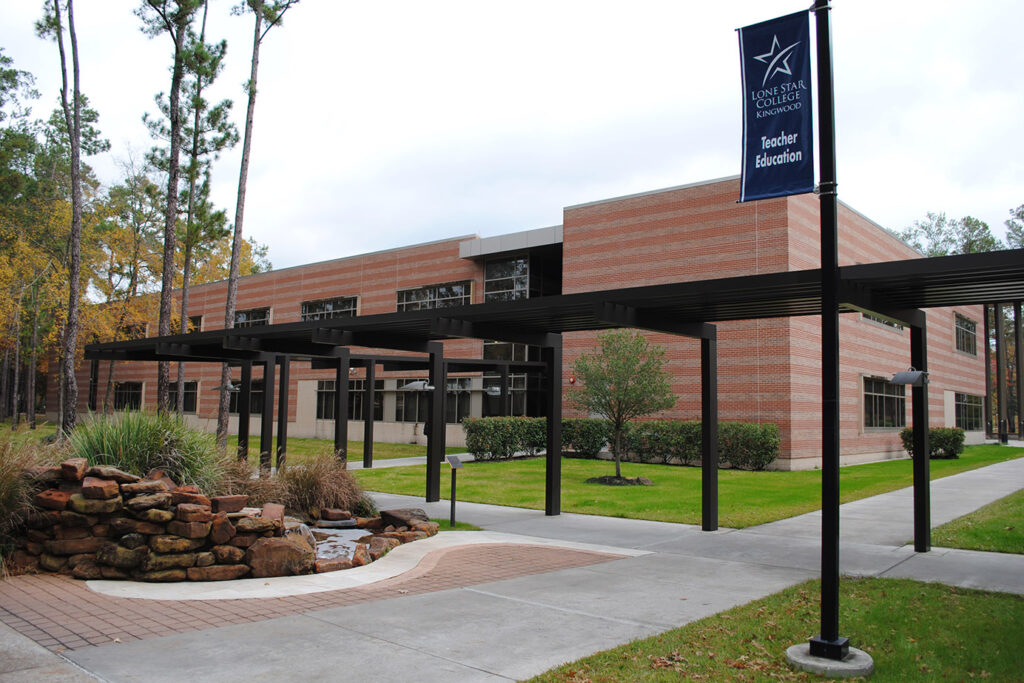
The online degree and certificate programs at Lone Star College include options for AutoCAD drafting, SolidWorks design, computer programming, app development, business administration, and teaching. Lone Star College provides online advisors and 24/7 IT support, and you can rent laptops and iPads for free through the school’s TechConnect program (select software programs, including Office 365, can also be downloaded for free by registered students).
Learn more about Lone Star College’s online trade school programs.
| Cost Per Credit | In-District: $103
Out-of-District: $231 Out-of-State: $290 |
| Student Enrollment | 68,415 |
| Graduation Rate | 17% |
| Required Credits to Graduate | Certificate: 12-36
Associate: 60 |
| Accreditation | Southern Association of Colleges and Schools Commission on Colleges |
| Location | The Woodlands, TX |
20. Central Community College
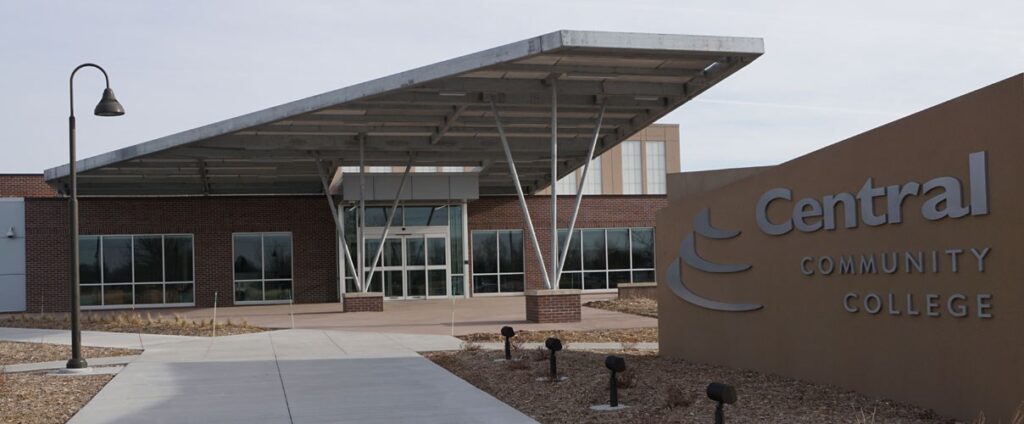
Central Community College offers online associate degree programs for several popular majors, including business administration, criminal justice, and early childhood education. They also offer online certificate programs for subject areas such as bookkeeping, health informatics, cybersecurity, and Lean Six Sigma. At the beginning of each semester, Central Community College’s virtual campus technicians hold several workshops to help familiarize students with their learning management system.
Learn more about Central Community College’s online trade school programs.
| Cost Per Credit | Resident: $96
Nonresident: $144 |
| Student Enrollment | 6,519 |
| Graduation Rate | 52% |
| Required Credits to Graduate | Certificate: 12-18
Diploma: 30-33 Associate: 62-65 |
| Accreditation | Higher Learning Commission |
| Location | Grand Island, NE |
Online Trade Schools and Programs Frequently Asked Questions
What are the benefits of attending an online trade school?
Marvin says, “The biggest benefit of all online programs, whether they lead to a traditional college degree or trade diploma or certification, is the flexibility of where students can complete the program.”
In online programs, courses are either synchronous, in which students attend class virtually at a designated time, or asynchronous, in which students access lessons and assignments on their own schedules, with no set class meetings. “These programs make learning more accessible to students who may not have the time to go into a classroom physically or who may have a hard time with transportation to and from campus.”
Another benefit is that in a trade program, students’ studies are focused on the topic that interests them. Although the general education requirements in an associate or bachelor’s degree program can be beneficial, some students may not want to spend the time and money on courses irrelevant to their career goals. A trade program allows students to concentrate on the skills and knowledge that will help them get the job they want.
Online trade programs also make career training more accessible because students aren’t limited by geography. Students don’t have to choose to either relocate to a new city or state or forgo the program they want to attend.
There are also financial benefits to online trade programs. Because trade programs typically last between one and two years, students pay less overall tuition than they would for a four-year degree. They can also join the workforce and start earning a salary sooner. The flexible nature of online learning means that currently employed students can continue working while in school. Not being tied to a specific location means students can choose to live in an area with a cost of living that fits their budget.
What are the disadvantages of attending an online trade school?
A key drawback of online trade schools is that not all career fields are conducive to online learning.
“For careers like plumbing or cosmetology, it may be possible to take some classes online,” Marvin says. “However, these and many other trades require hands-on learning, so students can prove they’ve mastered techniques before receiving their certificate or diploma or sitting for licensure exams.”
Many online programs address this issue by functioning in a hybrid format, in which coursework is completed online and hands-on learning happens in person through internships, apprenticeships, clinical rotations, labs, or other experiential learning settings. While this ensures students receive all the training they need to prepare for their careers, it may create barriers due to time or geography.
Students planning to attend an online trade school or program should also be aware that while this type of education will prepare them well for a specific career, it will offer little preparation for anything beyond that. The narrow, focused curriculum of an online trade program may mean that students miss out on transferable skills and exposure to other areas of study that can benefit them if they’re unhappy or unable to find employment in their chosen field.
How much does an online trade school or program cost?
Before committing to an online trade school program, prospective students should know how much it will cost them. Some schools offer resources for evaluating which programs will yield the greatest return on investment, which will help students make the most informed decision possible.
The cost of tuition for trade schools, which are considered two-year institutions, largely depends on whether the school is a public or private institution. On average, public two-year institutions charged in-state students $3,970 for tuition and fees in the 2021-22 academic year, whereas private nonprofit two-year institutions charged $17,735.
It should be noted that most public schools charge significantly higher tuition rates for out-of-state students compared with in-state students. Online students should be mindful of whether the school they plan to attend charges higher tuition for students who live in a different state.
There are other expenses involved with attending online trade school that students should also consider. Online students need reliable technology, including a computer, webcam, microphone, and internet access. They may also need to purchase learning materials like textbooks or software programs.
How long does it take to complete an online trade program?
An online trade program’s duration varies based on the credentials students earn and the specific program curriculum, with a typical range of six months to two years. Programs that lead to a certificate or diploma take less time, whereas the minimum length for an associate degree is two years.
A student’s enrollment status will impact how long it takes them to complete their program, with full-time students finishing faster than those who enroll part-time. Meanwhile, some schools may offer accelerated programs that condense a program’s coursework into a shortened time frame.
Is completing an online trade program worth it?
There are several reasons why attending an online trade program can be worthwhile. The Bureau of Labor Statistics (BLS) reports that the average salary for workers with a postsecondary nondegree award — the typical level of education for trade school graduates — is $45,790. That is nearly $4,000 more than the average salary for workers with only a high school diploma ($41,850).
For those who pursue a trade program that leads to an associate degree, there’s a more significant benefit. Workers with this level of education earn an average salary of $60,170, and their job opportunities are expected to grow by 5.7% over the next decade.
The BLS predicts that the number of jobs for workers with a postsecondary nondegree award will grow by 5.5% between 2022 and 2032. This growth rate is much faster than those with a high school diploma, which is expected to grow by just 0.9%.
However, remember that what you get out of your online education depends largely on what you put into it. Students who commit to attending classes, completing assignments, and building their networks will reap more rewards from their experience than those who can’t or won’t put the necessary time or energy into their learning.
5 Steps to Selecting an Online Trade School or Program
Step 1: Confirm that an online trade school or program is right for you
Getting clarity on educational and career goals is the first step in deciding where to continue your studies.
If you have yet to choose an area of study you want to pursue, now is a good time for some exploration. Consider your current interests and aptitudes and identify career paths that align with them. Participate in job shadowing or internship opportunities to get an up-close look at what a particular career entails. You can also utilize your network, including friends, family, coworkers, career counselors, and instructors, to help guide your career planning.
Once you’ve identified the career you want to pursue, confirm that a trade certificate or diploma program is the best course of study for obtaining employment in that field. Educational requirements for jobs vary by trade. For some, a certificate or diploma is sufficient. In other cases, earning an associate degree may lead to more employment opportunities, higher earning potential, and greater job security.
Step 2: Research schools and programs
Once you know what you will study, you can research schools and programs aligning with those interests.
Given the number of available trade schools and programs, setting parameters when starting your search can be helpful. Your parameters should be based on your specific needs and desires. Some common considerations include:
- Asynchronous or synchronous classes
- Full- or part-time enrollment options
- Fully remote or hybrid program formats
- Program duration
- Type of credential awarded
- Financial aid and scholarship opportunities
If you’re pursuing a trade that requires professional licensure or certification, make sure that any programs you’re considering meet the requirements for these professional credentials. Not obtaining the proper certificates could negatively impact your future employment opportunities.
Once you have a shortlist of trade schools you’re considering, you can use the following questions to guide your evaluations:
- How do online students interact with each other, program faculty, and staff?
- Are there any in-person requirements for hands-on learning, such as clinical rotations, internships, labs, etc.?
- What type of academic, technical, career, and healthcare support does the school offer to online students?
- What is the overall culture of the institution?
- Are financial aid and scholarships available?
Answers to these questions are typically available on the school’s website. You can also learn more by contacting the school’s admissions office and speaking to school representatives, attending virtual information sessions or open houses, following schools and programs on social media, or requesting digital or printed admissions materials.
Step 3: Select the school(s) to which you’ll apply
Conducting your research in step 2 will help you narrow down the list of schools you’re considering. There’s no ideal number of trade schools to apply to — some students identify a specific program they want to attend and apply only to that program. Other students may apply to several programs to increase their odds of acceptance.
If you’re applying to multiple schools, keeping track of requirements, deadlines, and your application status with a spreadsheet or document is helpful.
Step 4: Prepare and submit your application
The application process for trade schools and programs differs from institution to institution. Before starting an application, confirm with the school what exactly you need to submit and whether there are any specific qualifications students must have to be considered for the program.
Generally speaking, to be considered for a trade school, students must complete the school’s application and provide proof that they graduated high school or completed a GED program. Additional supplemental materials may include letters of recommendation, standardized test scores, and a resume.
Depending on the specific trade and program, you may also be required to complete a skills assessment or interview to confirm your readiness for the program.
Step 5: Determine how you’ll pay for your program
Now is also the ideal time to make arrangements for paying for your trade program.
Review your school’s financial support options, including scholarships, grants, and payment plans. If you’re currently employed, find out if your employer offers tuition assistance benefits and whether you’re eligible for this support.
Trade programs offered at accredited institutions are eligible for federal student loans and grants. Students must complete the Free Application for Federal Student Aid (FAFSA) to apply for federal student loans. Students are only eligible for federal financial aid if their school is accredited. In this case, the only loan option is a private education loan, which can have less favorable interest rates and repayment terms.
If you’re borrowing money to pay for your trade program, we strongly encourage you to review all loan options and information about interest rates and repayment terms before committing to a student loan.
Read More About Online Trade Schools and Programs
Interested in a degree instead?
Learn more about online degrees, their start dates, transferring credits, availability of financial aid, and more by contacting the universities below.